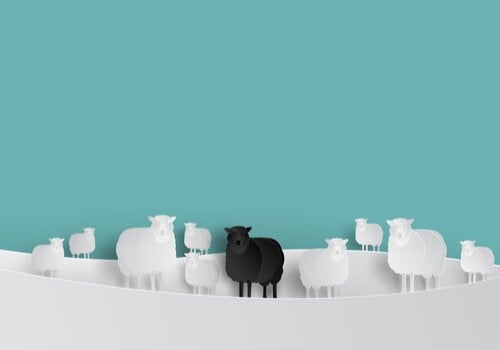They say that in each family there is a black sheep, this metaphor is used to classify people who are different from most, these differences may be due to physical appearance, preferences or behaviors, in this way being the black sheep in the family means being different from other family members.
However, the black sheep also appears to have associated negative aspects. No one wants to be the black sheep of a group, as that involves adjectives like “Marginalized”, “Deviated” or ‘antisocial’, as well as others related to the disease. Accepted qualities In addition, the term black sheep is also intended for scapegoats or those who carry the guilt of others.
- People belong to different groups.
- A human tendency is to simplify; We simplify the world to understand it more easily.
- In this way.
- We create different categories in which we place people.
- When creating these categories.
- We also include in some of them.
- This is called the theory of self-catechization.
By creating categories and grouping them, we form groups and consider that whoever shares these categories belongs to this group, not to mention that we are also in some of these groups, according to the theory of social identity, these groups to which we belong Belong do us good They give us a sense of belonging.
“A family without a black sheep is not a typical family. “- Heinrich Boll-
Our group, also called endogroup, will differ from other groups or exogroups, so let’s describe our group not only for what it is, but also for what is compared to exogroups, in this way the endogroup will do better than an exogroup that is worse. Therefore, we tend to compare it with the lower groups. However, this is not always true.
Sometimes we have to compare the final group with higher groups, comparison in which we lose, fortunately there are different mechanisms that make us feel good in our group, even when it is inferior to other groups. The two best-known mechanisms, are the favoritism of the endogroup and exogroup discrimination, included in the inclination of the endogroup.
In-group favoritism is favoring in-group members. This can happen by helping them more or by keeping a better image of them. Rather, outgroup discrimination is to reduce the value of outgroup members, which is generally done through prejudice or discriminatory behavior.
In any case, we value endogroup members more than exogroup members, but what happens when he?Do you belong to our group?
“In a faraway land, there was a black sheep many years ago. He was shot. A century later, the repentant herd erected a beautiful statue in his honor in the park. So, every time a black sheep appeared, it was quickly executed so that future generations of ordinary sheep could practice the art of sculpture. ?Augusto Monterroso?
Sometimes bad guys are part of our group. When this happens, when the members of the endogroup do not meet the standards or violate the values of the group, the black sheep effect occurs What do we do on these occasions?Depending on the black sheep effect, we treat members of our group more harshly, i. e. if someone has offensive behavior, we treat that person worse if they are a member of the final group than if they are an exogroup.
But why do we evaluate our group less? The black sheep effect indicates that treating them more harshly will keep the positive image of our group, that is, a group that punishes those who would be derailed is better regarded than a group that remains impassive in the face of non-compliance with its rules.
As a result, members of the endogroup are responsible for punishing and ensuring that other members follow the group’s standards. As the popular saying goes, “He who loves you will also make you cry. “

